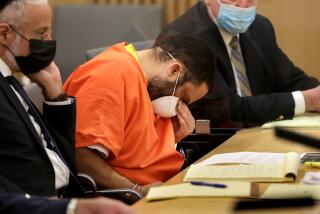Teen Killer of Roommate Loses Appeal of Conviction
- Share via
SANTA ANA — A state appellate court upheld the first-degree murder conviction of a Huntington Beach teen-ager who shot his sleeping roommate in the head and then burned the body near the beach.
Brian Christopher Applegate, who claimed his roommate was physically and sexually abusive, sought to overturn the conviction, alleging misconduct by the prosecution, errors in jury instructions and improper admission of a videotape showing the victim’s charred body.
The 4th District Court of Appeal rejected all of Applegate’s arguments in an unanimous decision released Monday.
Applegate, 19, was convicted last year and sentenced to the California Youth Authority until he reaches 25 for shooting Paul Londono, 25. Applegate testified that he had been repeatedly raped and beaten by his roommate, and that he felt killing him was the only way to escape the torment. Applegate said he shot Londono in his sleep after being raped during an argument on Jan. 8, 1989.
Applegate then stuffed Londono’s body into a sleeping bag and took it to an incline off Pacific Coast Highway, poured gasoline on it and set it ablaze.
Several months after the shooting, acquaintances of Applegate noticed blood stains on his bedding and notified police. After an investigation, Applegate was arrested.
According to witnesses who testified at the trial, Applegate met Londono in a parking lot at a Florida restaurant where the defendant worked. Londono and Applegate struck up a friendship and later moved to Huntington Beach together.
But the friendship soured in California, authorities said. Applegate, who had been on probation for car theft in Florida, testified that Londono threatened to alert the authorities and have him sent to prison for violating his probation if he did not submit to a homosexual relationship.
The prosecutor presented witnesses to counter Applegate’s claim that he was trapped in the relationship. Witnesses testified that on the day Londono was killed, he had told relatives that he had been trying to get Applegate to move out.
In his appeal, Applegate argued that the judge improperly excluded a jury instruction that would have allowed them to “reduce murder to manslaughter” if it found there was “a course of ill treatment which can induce a homicidal response . . . (that) the accused reasonably believes is likely to continue.”
Like the trial judge, the appellate justices said the instruction was misleading and rightfully not submitted to the jury.
The justices also rejected the defendant’s claim that a videotape of Londono’s burned corpse was prejudicial.
“Evidence of the attempted cremation was highly relevant to prove premeditation and consciousness of guilt,” the opinion said.
Finally, the appellate court rejected Applegate’s argument that the prosecutor asked improper questions during the cross-examination of an expert witness.
The prosecutor apparently asked a defense psychologist why her report failed to address a statement from a Florida man who said that Applegate and Londono were male prostitutes.
The justices dismissed the argument, noting that the jury heard evidence that the source of the statement was “a felon, a liar, and that his dates did not jibe with the defendant’s presence in Florida.”
More to Read
Sign up for Essential California
The most important California stories and recommendations in your inbox every morning.
You may occasionally receive promotional content from the Los Angeles Times.













